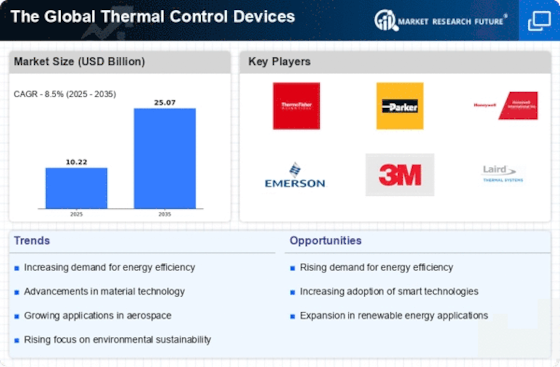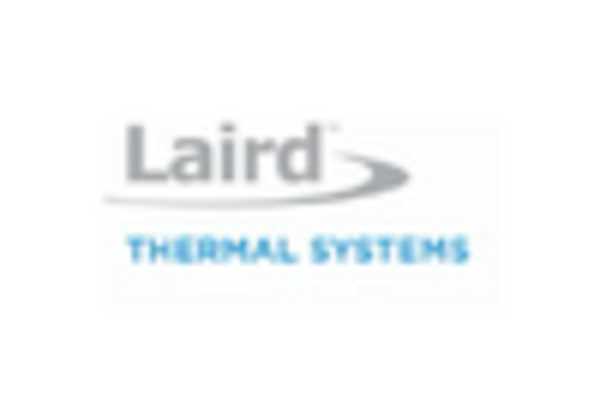-
EXECUTIVE SUMMARY
-
MARKET INTRODUCTION
-
Definition
-
Scope of the Study
- Research Objective
- Assumptions
- Limitations
-
RESEARCH METHODOLOGY
-
Overview
-
Data Mining
-
Secondary Research
-
Primary Research
- Primary Interviews and Information Gathering Process
- Breakdown of Primary Respondents
-
Forecasting Model
-
Market Size Estimation
- Bottom-Up Approach
- Top-Down Approach
-
Data Triangulation
-
Validation
-
MARKET DYNAMICS
-
Overview
-
Drivers
-
Restraints
-
Opportunities
-
MARKET FACTOR ANALYSIS
-
Value Chain Analysis
-
Porter’s Five Forces Analysis
- Bargaining Power of Suppliers
- Bargaining Power of Buyers
- Threat of New Entrants
- Threat of Substitutes
- Intensity of Rivalry
-
COVID-19 Impact Analysis
- Market Impact Analysis
- Regional Impact
- Opportunity and Threat Analysis
-
Thermal Control Devices Market, BY MATERIAL
-
Overview
-
Adhesive Material
-
Non-Adhesive Material
-
Thermal Control Devices Market, BY DEVICE
-
Overview
-
Conduction Cooling Devices
-
Convection Cooling Devices
-
Advanced Cooling Devices
-
Hybrid Cooling Devices
-
Thermal Control Devices Market, BY END USER
-
Overview
-
Aerospace & Defense
-
Automotive
-
Servers & Data Centers
-
Consumer Electronics
-
Enterprises
-
Healthcare
-
Others
-
Thermal Control Devices Market, BY REGION
-
Overview
-
North America
- US
- Canada
-
Europe
- Germany
- France
- UK
- Italy
- Spain
- Rest of Europe
-
Asia-Pacific
- China
- India
- Japan
- South Korea
- Australia
- Rest of Asia-Pacific
-
Rest of the World
- Middle East
- Africa
- Latin America
-
COMPETITIVE LANDSCAPE
-
Overview
-
Competitive Analysis
-
Market Share Analysis
-
Major Growth Strategy in the Global Thermal Control Devices Market,
-
Competitive Benchmarking
-
Leading Players in Terms of Number of Developments in the Global Thermal Control Devices Market,
-
Key developments and Growth Strategies
- New Product Launch/Service Deployment
- Merger & Acquisitions
- Joint Ventures
-
Major Players Financial Matrix
- Sales & Operating Income, 2022
- Major Players R&D Expenditure. 2022
-
COMPANY PROFILES
-
Applied Materials, Inc.
- Company Overview
- Financial Overview
- Products Offered
- Key Developments
- SWOT Analysis
- Key Strategies
-
Cooltech Solutions, Inc.
- Company Overview
- Financial Overview
- Products Offered
- Key Developments
- SWOT Analysis
- Key Strategies
-
Intel Corporation
- Company Overview
- Financial Overview
- Products Offered
- Key Developments
- SWOT Analysis
- Key Strategies
-
Parker Hannifin Corporation
- Company Overview
- Financial Overview
- Products Offered
- Key Developments
- SWOT Analysis
- Key Strategies
-
Honeywell International Inc.
- Company Overview
- Financial Overview
- Products Offered
- Key Developments
- SWOT Analysis
- Key Strategies
-
Thermocore, Inc.
- Company Overview
- Financial Overview
- Products Offered
- Key Developments
- SWOT Analysis
- Key Strategies
-
Delta Electronics, Inc.
- Company Overview
- Financial Overview
- Products Offered
- Key Developments
- SWOT Analysis
- Key Strategies
-
Wakefield-Vette
- Company Overview
- Financial Overview
- Products Offered
- Key Developments
- SWOT Analysis
- Key Strategies
-
Body Corporation
- Company Overview
- Financial Overview
- Products Offered
- Key Developments
- SWOT Analysis
- Key Strategies
-
Henkel AG & Co. KGaA
- Company Overview
- Financial Overview
- Products Offered
- Key Developments
- SWOT Analysis
- Key Strategies
-
APPENDIX
-
References
-
Related Reports
-
-
LIST OF TABLES
-
GLOBAL THERMAL CONTROL DEVICES MARKET, SYNOPSIS, 2020-2034
-
GLOBAL THERMAL CONTROL DEVICES MARKET, ESTIMATES & FORECAST, 2020-2034 (USD BILLION)
-
Thermal Control Devices Market, BY MATERIAL, 2020-2034 (USD BILLION)
-
Thermal Control Devices Market, BY DEVICE, 2020-2034 (USD BILLION)
-
Thermal Control Devices Market, BY END USER, 2020-2034 (USD BILLION)
-
NORTH AMERICA: Thermal Control Devices Market, BY MATERIAL, 2020-2034 (USD BILLION)
-
NORTH AMERICA: Thermal Control Devices Market, BY DEVICE, 2020-2034 (USD BILLION)
-
NORTH AMERICA: Thermal Control Devices Market, BY END USER, 2020-2034 (USD BILLION)
-
US: Thermal Control Devices Market, BY MATERIAL, 2020-2034 (USD BILLION)
-
US: Thermal Control Devices Market, BY DEVICE, 2020-2034 (USD BILLION)
-
US: Thermal Control Devices Market, BY END USER, 2020-2034 (USD BILLION)
-
CANADA: Thermal Control Devices Market, BY MATERIAL, 2020-2034 (USD BILLION)
-
CANADA: Thermal Control Devices Market, BY DEVICE, 2020-2034 (USD BILLION)
-
CANADA: Thermal Control Devices Market, BY END USER, 2020-2034 (USD BILLION)
-
EUROPE: Thermal Control Devices Market, BY MATERIAL, 2020-2034 (USD BILLION)
-
EUROPE: Thermal Control Devices Market, BY DEVICE, 2020-2034 (USD BILLION)
-
EUROPE: Thermal Control Devices Market, BY END USER, 2020-2034 (USD BILLION)
-
GERMANY: Thermal Control Devices Market, BY MATERIAL, 2020-2034 (USD BILLION)
-
GERMANY: Thermal Control Devices Market, BY DEVICE, 2020-2034 (USD BILLION)
-
GERMANY: Thermal Control Devices Market, BY END USER, 2020-2034 (USD BILLION)
-
FRANCE: Thermal Control Devices Market, BY MATERIAL, 2020-2034 (USD BILLION)
-
FRANCE: Thermal Control Devices Market, BY DEVICE, 2020-2034 (USD BILLION)
-
FRANCE: Thermal Control Devices Market, BY END USER, 2020-2034 (USD BILLION)
-
ITALY: Thermal Control Devices Market, BY MATERIAL, 2020-2034 (USD BILLION)
-
ITALY: Thermal Control Devices Market, BY DEVICE, 2020-2034 (USD BILLION)
-
ITALY: Thermal Control Devices Market, BY END USER, 2020-2034 (USD BILLION)
-
SPAIN: Thermal Control Devices Market, BY MATERIAL, 2020-2034 (USD BILLION)
-
SPAIN: Thermal Control Devices Market, BY DEVICE, 2020-2034 (USD BILLION)
-
SPAIN: Thermal Control Devices Market, BY END USER, 2020-2034 (USD BILLION)
-
UK: Thermal Control Devices Market, BY MATERIAL, 2020-2034 (USD BILLION)
-
UK: Thermal Control Devices Market, BY DEVICE, 2020-2034 (USD BILLION)
-
UK: Thermal Control Devices Market, BY END USER, 2020-2034 (USD BILLION)
-
REST OF EUROPE: Thermal Control Devices Market, BY MATERIAL, 2020-2034 (USD BILLION)
-
REST OF EUROPE: Thermal Control Devices Market, BY DEVICE, 2020-2034 (USD BILLION)
-
REST OF EUROPE: Thermal Control Devices Market, BY END USER, 2020-2034 (USD BILLION)
-
ASIA-PACIFIC: Thermal Control Devices Market, BY MATERIAL, 2020-2034 (USD BILLION)
-
ASIA-PACIFIC: Thermal Control Devices Market, BY DEVICE, 2020-2034 (USD BILLION)
-
ASIA-PACIFIC: Thermal Control Devices Market, BY END USER, 2020-2034 (USD BILLION)
-
JAPAN: Thermal Control Devices Market, BY MATERIAL, 2020-2034 (USD BILLION)
-
JAPAN: Thermal Control Devices Market, BY DEVICE, 2020-2034 (USD BILLION)
-
JAPAN: Thermal Control Devices Market, BY END USER, 2020-2034 (USD BILLION)
-
CHINA: Thermal Control Devices Market, BY MATERIAL, 2020-2034 (USD BILLION)
-
CHINA: Thermal Control Devices Market, BY DEVICE, 2020-2034 (USD BILLION)
-
CHINA: Thermal Control Devices Market, BY END USER, 2020-2034 (USD BILLION)
-
INDIA: Thermal Control Devices Market, BY MATERIAL, 2020-2034 (USD BILLION)
-
INDIA: Thermal Control Devices Market, BY DEVICE, 2020-2034 (USD BILLION)
-
INDIA: Thermal Control Devices Market, BY END USER, 2020-2034 (USD BILLION)
-
AUSTRALIA: Thermal Control Devices Market, BY MATERIAL, 2020-2034 (USD BILLION)
-
AUSTRALIA: Thermal Control Devices Market, BY DEVICE, 2020-2034 (USD BILLION)
-
AUSTRALIA: Thermal Control Devices Market, BY END USER, 2020-2034 (USD BILLION)
-
SOUTH KOREA: Thermal Control Devices Market, BY MATERIAL, 2020-2034 (USD BILLION)
-
SOUTH KOREA: Thermal Control Devices Market, BY DEVICE, 2020-2034 (USD BILLION)
-
SOUTH KOREA: Thermal Control Devices Market, BY END USER, 2020-2034 (USD BILLION)
-
REST OF ASIA-PACIFIC: Thermal Control Devices Market, BY MATERIAL, 2020-2034 (USD BILLION)
-
REST OF ASIA-PACIFIC: Thermal Control Devices Market, BY DEVICE, 2020-2034 (USD BILLION)
-
REST OF ASIA-PACIFIC: Thermal Control Devices Market, BY END USER, 2020-2034 (USD BILLION)
-
REST OF THE WORLD: Thermal Control Devices Market, BY MATERIAL, 2020-2034 (USD BILLION)
-
REST OF THE WORLD: Thermal Control Devices Market, BY DEVICE, 2020-2034 (USD BILLION)
-
REST OF THE WORLD: Thermal Control Devices Market, BY END USER, 2020-2034 (USD BILLION)
-
MIDDLE EAST: Thermal Control Devices Market, BY MATERIAL, 2020-2034 (USD BILLION)
-
MIDDLE EAST: Thermal Control Devices Market, BY DEVICE, 2020-2034 (USD BILLION)
-
MIDDLE EAST: Thermal Control Devices Market, BY END USER, 2020-2034 (USD BILLION)
-
AFRICA: Thermal Control Devices Market, BY MATERIAL, 2020-2034 (USD BILLION)
-
AFRICA: Thermal Control Devices Market, BY DEVICE, 2020-2034 (USD BILLION)
-
AFRICA: Thermal Control Devices Market, BY END USER, 2020-2034 (USD BILLION)
-
LATIN AMERICA: Thermal Control Devices Market, BY MATERIAL, 2020-2034 (USD BILLION)
-
LATIN AMERICA: Thermal Control Devices Market, BY DEVICE, 2020-2034 (USD BILLION)
-
LATIN AMERICA: Thermal Control Devices Market, BY END USER, 2020-2034 (USD BILLION)
-
LIST OF FIGURES
-
RESEARCH PROCESS
-
MARKET STRUCTURE FOR THE GLOBAL THERMAL CONTROL DEVICES MARKET
-
MARKET DYNAMICS FOR THE GLOBAL THERMAL CONTROL DEVICES MARKET
-
GLOBAL THERMAL CONTROL DEVICES MARKET, SHARE (%), BY MATERIAL, 2022
-
GLOBAL THERMAL CONTROL DEVICES MARKET, SHARE (%), BY DEVICE, 2022
-
GLOBAL THERMAL CONTROL DEVICES MARKET, SHARE (%), BY END USER, 2022
-
GLOBAL THERMAL CONTROL DEVICES MARKET, SHARE (%), BY END USER, 2022
-
GLOBAL THERMAL CONTROL DEVICES MARKET, SHARE (%), BY REGION, 2022
-
NORTH AMERICA: THERMAL CONTROL DEVICES MARKET, SHARE (%), BY REGION, 2022
-
EUROPE: THERMAL CONTROL DEVICES MARKET, SHARE (%), BY REGION, 2022
-
ASIA-PACIFIC: THERMAL CONTROL DEVICES MARKET, SHARE (%), BY REGION, 2022
-
REST OF THE WORLD: THERMAL CONTROL DEVICES MARKET, SHARE (%), BY REGION, 2022
-
GLOBAL THERMAL CONTROL DEVICES MARKET: COMPANY SHARE ANALYSIS, 2022 (%)
-
APPLIED MATERIALS, INC.: FINANCIAL OVERVIEW SNAPSHOT
-
APPLIED MATERIALS, INC.: SWOT ANALYSIS
-
COOLTECH SOLUTIONS, INC.: FINANCIAL OVERVIEW SNAPSHOT
-
COOLTECH SOLUTIONS, INC.: SWOT ANALYSIS
-
INTEL CORPORATION: FINANCIAL OVERVIEW SNAPSHOT
-
INTEL CORPORATION: SWOT ANALYSIS
-
PARKER HANNIFIN CORPORATION: FINANCIAL OVERVIEW SNAPSHOT
-
PARKER HANNIFIN CORPORATION: SWOT ANALYSIS
-
HONEYWELL INTERNATIONAL INC.: FINANCIAL OVERVIEW SNAPSHOT
-
HONEYWELL INTERNATIONAL INC.: SWOT ANALYSIS
-
THERMOCORE, INC.: FINANCIAL OVERVIEW SNAPSHOT
-
THERMOCORE, INC.: SWOT ANALYSIS
-
DELTA ELECTRONICS, INC.: FINANCIAL OVERVIEW SNAPSHOT
-
DELTA ELECTRONICS, INC.: SWOT ANALYSIS
-
WAKEFIELD-VETTE: FINANCIAL OVERVIEW SNAPSHOT
-
WAKEFIELD-VETTE: SWOT ANALYSIS
-
BODY CORPORATION: FINANCIAL OVERVIEW SNAPSHOT
-
BODY CORPORATION: SWOT ANALYSIS
-
HENKEL AG & CO. KGAA: FINANCIAL OVERVIEW SNAPSHOT
-
HENKEL AG & CO. KGAA: SWOT ANALYSIS


















Leave a Comment